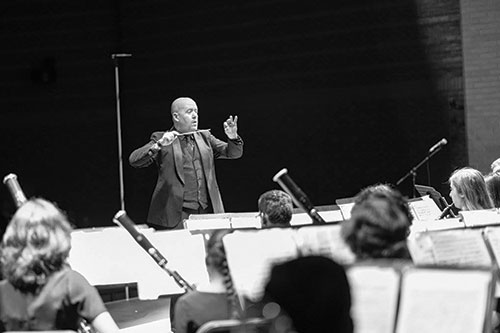Last month’s issue featured Gerry Miller writing about his transition to Coppell High School, a strong program that had had the same director for 25 years. This month, one of the Coppell students shares her thoughts on the transition.

One year ago, the students of the Coppell High School band underwent the most significant transition in the past quarter of a century of the program: switching head director from Scott Mason to Gerry Miller. Mr. Mason fought his battle against cancer and retired after 25 years at Coppell in the spring of 2016, so Mr. Miller came into our lives through difficult circumstances. At the end of my freshman year, Mr. Mason stood before us and thanked us for being a part of the band program he worked so hard to create. In this speech, one of the last times we saw our revered director, he passed the program on to his successor, and we entered the era of transition.
I vividly remember a common sense of fear in the weeks preceding band camp the summer our new director took over. No one knew what to expect. No one could fathom how any new director could ever match the collective love we had for Mr. Mason. There was trash talk, research on our new director’s last band, and predictions about what would happen to our program. Even I, a relatively optimistic person, felt less than confident in our new instructor. As the year went on, our uneasiness dissipated and confidence began to grow. Specific actions taken by our new director guided us through the transition with as much ease as was possible, considering the unhappy conditions leading to the change. They helped our staff, students, and parents receive the changes with less apprehension.
Student Culture
Even before the official date of transition, Mr. Miller observed the student culture of the CHS band. The spring before he took over, he visited the band hall daily. He conversed with students, introducing himself and watching us interact with one another. Within a few months, he knew the names of almost all 400+ high school band students, as well as a large portion of the middle school band students in the district. While implementing his philosophy into the program, he remained respectful of existing customs, changing the ones that needed amendments, allowing to continue those that did not clash with his vision for our future.
Once he began his work in August, Mr. Miller was present before and after rehearsals and school, and made himself available to students at all times. During one conversation with the entire band, he declared that if there was ever something important that we needed to speak to him about immediately, all we had to say was that “we need to talk,” and he would understand and provide his attention, direction, and assistance. He gave us examples of how previous students had used this key phrase over the years, as well as the tribulations that he had helped them to navigate. He made clear that he would be willing to help whether the problem was band related or not. He always made himself available to talk, and we quickly came to trust that he was as much our advocate as our director.
Mr. Miller introduced and highlighted the philosophy of a servant leader. He implemented a leadership camp for the student leaders, and within a few days led our group to create a mission statement, review the tenets of the servant leader, and take votes on some of the proposed changes to the program. He shifted the student culture from one of hierarchy to one fueled by connections and mutual respect. He taught us that some band members are in the program because they want to major in music, some are in the program because of the friendships they value, and some are in the program because they seek stability and connection. As he once noted, “in seeking connections with students, the directors built a small community inside of a larger band program that placed equal value on the All-State performers as on the clarinetist in the bottom band.” Each individual is a respected member of the organization, and the mission of the organization is to meet each individual in their place of need.
He encourages us to extend these connections outside our band. During the summer, we brought food for the football team one early morning and breakfast for the soccer team another day. The choir was included in last year’s marching show, and the drill team was included in this year’s marching show. Close to the end of our marching season last year, the choir wrote notes and posters to hang up in the band hall, wishing us well at the state marching contest, and the drill team did the same for us this year. Mr. Miller encourages us to make connections with band students even outside of our district. While in the past we had been taught to appear intimidating to other schools we would come across during competitions, he encouraged us to be “the nicest band they’d ever met.” We learned to trust in our strength and to be generous to others.
Parents and Community Involvement
A major success of the transition was Mr. Miller’s relationship with the band parents. Just like the students, the Band Boosters underwent a large change. Mr. Miller made himself available for the parents to ask questions. At parent meetings, he explained his reasoning behind all the changes. At the introductory parent meeting each season, he described why band benefits each student, regardless of whether their future career includes the study of music. He eloquently explains program activities in ways that both the veteran and inexperienced parents can understand. Mr. Miller made clear to the band parents that he was interested in assisting with issues that may come up for any student. Just as he gained the trust of the students, he gained the trust of the parents by reassuring them that the need of the individual would not be superseded by the need of the program. He also extended his communications electronically, introducing a weekly email outlining the events of the week and maintaining an up-to-date website. His communication with the parents and community made the transition easier.
Expanding outward from the parents and students of the high school band program, Mr. Miller created a presence in the three feeder middle schools of the district. He visited with the middle school directors on site at least once a week and offered younger students much more information about high school band than I received as a middle schooler. He encouraged high schoolers to visit the middle schools, and created interaction between us that ultimately brought in more members into the program. Attrition by new members decreased because they knew what to expect from his high school program. During marching season last year, an eighth-grade night was introduced. All eighth-grade band members from the middle schools were assigned a specific high school band member as their mentor while we played in the stands together during a football game. In May, when the middle schoolers were choosing classes they would take in ninth grade, a hype day was hosted for the incoming freshmen to experience a day in the life of a high school band member and to encourage more interaction with their future bandmates. He shed light on the mystery that was high school band, and in response, many more eighth graders joined the program than in any of the previous years.
My Perspective
When I entered the high school band program as a freshman, I was ready to undergo the Mason experience about which I had heard so many rumors. I expected to work hard and learn what it meant to be a part of the high school band. Mr. Mason was highly revered, and I was enthralled to be under his teaching. In February of that year, Mr. Mason retired due to a health crisis, leaving us wondering what would happen next. I, like the rest of my peers, was loyal to our director and suspicious of any change.
As a sophomore, I was chosen to be a section leader, which meant I led the charge in embracing the new system. I was wary of switching directors, but I found myself more optimistic than the 11th and 12th graders, who had been under Mr. Mason’s direction for the majority of their high school life. With the communication and the personal connection I made with Mr. Miller, I adapted quicker than many of my bandmates. Even a year later, many are not sure about the program now compared with how things were done before, although those students are outnumbered by those who have embraced the change.
One of the most memorable moments for me was when we learned that Mr. Mason had lost his battle against cancer in September of 2016. It was an enormously difficult time for our band. As hundreds of his past students sat at his memorial, I couldn’t help but notice that many of his favorite hymns that we were singing were a part of our marching show for that year, including David Holsinger’s On a Hymnsong of Philip Bliss and John Newton’s Amazing Grace. We gained a new sense of trust and respect in Mr. Miller that day, as we recognized his tribute to Mr. Mason in our marching show.
The transition of our band program from Mr. Mason to Mr. Miller was among the most challenging changes the band has ever seen. Many students felt that a piece of our identity had been stripped from us. Now into our second year of the transition, the CHS band program is decidedly different than what it was before. The Mr. Mason era gave way to the Mr. Miller era, and our band keeps moving forward and accelerating to new heights.
For any director or teacher coming into a new program, one of the most important things any student could humbly advise is to understand that trust takes time. The younger students will likely be the ones to accept the transition quicker than the older students, as was the case for us. The respect our new administration had for their predecessor was what encouraged our trust in them.
I would like to give my thanks to Scott Mason for the 25 years of exemplary leadership he gave to the Coppell High School Band. His memory will live on in our hearts and in the band hall, and our love for him is transmitted in every note we play.






